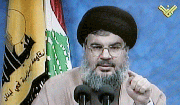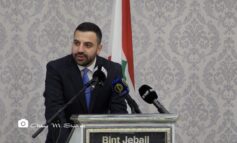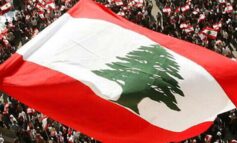
Nasrallah hits out at government
BEIRUT — Hizbullah’s leader Hassan Nasrallah has warned that any crackdown by the government on the Shi’a organizaion would be tantamount to a “declaration of war.”
Hassan Nasrallah’s comments were broadcast on television on Thursday, as street clashes in Lebanon between government loyalists and opposition supporters entered a second day.
The civil unrest began on Wednesday during a general strike, called by the main labor union over price increases and wage demands, which quickly developed into a confrontation between supporters of the government and the opposition.

On Thursday, residents of the capital woke up to burning tires and roadblocks, with many streets closed and traffic light in the Muslim section of the city.
In his speech, Nasrallah said the crisis in Lebanon had “entered a new phase” because of what Hizbullah claims are government moves against the Shi’a group.
The government has accused Hizbullah of installing spy cameras at the airport and has removed the airport’s head of security, a figure close to the opposition, from his post.
It is also investigating Hizbullah’s private telephone network.
Nasrallah insisted that Hizbullah’s telephone network, was an “essential tool for managing combat” and stressed its importance to Hizbullah in its role as a “resistance movement.”
“We don’t have the technologies that the Americans and Israelis have,” he said, calling the government’s investigation “a declaration of war and the launching of war by the government … for the benefit of America and Israel.”
He said that Hizbullah would act to stop any attempt by the government to dismantle the network.
Commenting on Nasrallah’s speech, Rami Khoury, editor-at-large for the Lebanese newspaper The Daily Star, said Nasrallah had been careful to present Hizbullah as acting out of self-defense.
“He’s made it clear that the government has declared war on Hizbullah and Hizbullah is defending itself,” he told Al Jazeera.
“What you need now is some credible, expert mediator — probably from the Arab world — to step in,” he added.

The opposition has vowed to keep up the protests until the government cancels the decisions taken earlier in the week to fire the airport employee and investigate the group’s communications system.
Reports on Lebanon’s Future television suggested that Michel Suleiman, the Lebanese military chief, could resign and pull the army off the streets if the country’s political crisis is not resolved.
But on Thursday, the army and riot police were still in evidence, spread out across the capital, where many schools and businesses remained shut for the second straight day.
The Lebanese army command issued a call for calm, saying that if the violence continued, it would affect the unity of the military.
At least eight people were reported wounded in clashes around the country.
Five people were wounded, four of them women, a security official in the eastern town of Chtaura was reported by the AFP news agency as saying.
Three people were also wounded in the northern city of Tripoli in a gun-fight between rival factions.
The highway between Beirut and the southern coastal city of Sidon was also closed by government supporters who burned tires and dumped piles of earth on the road.
Hizbullah supporters and their allies tightened their grip on Beirut International Airport — Lebanon’s only air link to the outside world — and other main streets, paralyzing the city.
An airport official said that all incoming and outgoing flights had been canceled until at least 4 pm (13:00 GMT), but it was unclear whether normal traffic would resume after that.
One flight to London did leave Beirut early on Thursday.
Rula Amin, Al Jazeera’s correspondent in Beirut, reported that people were trying to flee the city.
“Some people are leaving the capital to remote villages, others are walking out of their homes with suitcases, heading for the airport by foot, hoping that any plane will take them,” she said.
“Tension is rising — today violence spread outside the capital… You can see more and more people on the street with guns.”
Meanwhile, Saudi Arabia warned the opposition against an escalation of the situation.
“The kingdom urges the groups behind the escalation to reconsider their position, and to realize that leading Lebanon towards turmoil will not bring victory to any party except extremist external forces,” the state’s SPA news agency quoted an official as saying.
Fears that the political conflict in Lebanon could escalate into sectarian conflict were heightened when Mohammed Rashid Kabbani, Lebanon’s Sunni grand mufti, spoke against Hizbullah for the first time.
“Sunni Muslims in Lebanon have had enough,” Kabbani said in a televised address from his office.
The Sunni spiritual leader refered to Hizbullah as “armed gangs of outlaws that have carried out the ugliest attacks against the citizens and their safety.”
Al Jazeera and agencies.






Leave a Reply